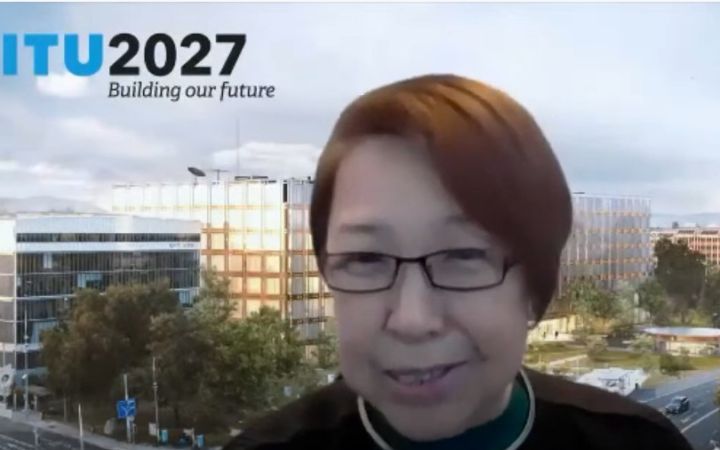- Over 200 attendees joined the virtual conference Closing the Digital Divide: Strengthening Digital Literacy and Infrastructure on 24 March 2022.
- The conference was hosted by UNITAR Division for Prosperity.
- A diverse panel of digital-infrastructure developers, service providers, regulators, and facilitators of digital skills programmes talked about replicating and upscaling digitization initiatives in Afghanistan, Iraq and the Sahel region.
- Marginalized populations need digital literacy and digital infrastructure to adopt and use digital technologies and reduce the digital divide.
- Cross-sectoral collaboration, regional implementation and grass-roots initiatives are key.
3 May 2022, Hiroshima, Japan – The COVID-19 pandemic has exacerbated socioeconomic disparities around the world. It especially highlighted the widening digital divide within societies and between industrialized and developing economies. With 96 per cent of the 2.9 billion people without Internet access living in developing countries, closing this divide requires more attention than ever before.
The virtual conference Closing the Digital Divide: Strengthening Digital Literacy and Infrastructure, held on 24 March 2022 and hosted by UNITAR Division for Prosperity, explored how digital infrastructure developments and digital skills trainings can boost employability and create entrepreneurial opportunities to bridge the digital divide.
Several key messages emerged from the conference.
- Youth, women and marginalized communities are essential in transforming the digital economy. Digital education and entrepreneurial training can help them harness their potential.
- Collaborative partnerships among stakeholders from public and private sectors can create opportunities for digitization.
- Digital infrastructure can be effectively developed only if all users have the necessary technological skills.
Opening Remarks and Keynote Address
- Opening remarks: Nikhil Seth, UN Assistant Secretary-General, Executive Director, UNITAR
- Keynote address: Nur Sulyna Abdullah, Chief of Digital Knowledge Hub Department, International Telecommunication Union (ITU)
Nikhil Seth, Executive Director of UNITAR, touched on the impact communication technology can have in accelerating innovation and progress. He stressed the importance of strengthening digital literacy and developing digital infrastructure. Making digital technology accessible is not enough. People newly connected to digital technology need digital education too.
Globally, there are still 2.9 billion people offline, with 96 per cent of them living in the developing world. UNITAR’s mission is to develop the individual, institutional, and organizational capacities of countries and other UN stakeholders through high-quality learning solutions, products and services, which enhance and support decision-making capabilities at a country level for overcoming global challenges. — Nikhil Seth, UNITAR Executive Director
In her keynote address, Nur Sulyna Abdullah spoke about the speedy adoption of information and communication technologies and the need for inclusive participation so that societies can harness the full potential of digitization. She detailed the importance of multi-stakeholder initiatives like ITU’s rural e-service efforts and the global leadership coalition, Partner to Connect (P2C). P2C focuses on access, adoption, value creation and investment incentivization through their Action Framework and Pledging Platform involving government and private stakeholders.
ITU’s 2021 figures estimated 4.9 billion Internet users worldwide, with an estimated 800 million new users since 2019. Many of these users are still not ‘meaningfully’ connected, due to expensive, slow or unreliable infrastructure. Those lacking digital skills are most likely to experience unemployment. — Nur Sulyna Abdullah, Chief of Digital Knowledge Hub Department, International Telecommunication Union (ITU)
Session 1: Why Digital Transformation Is Important for Sustainable Prosperity – A Global Overview of Accessibility, Literacy and Inclusion
This session focused on the complexity of digital empowerment, addressing challenges surrounding gender, literacy, data accuracy, infrastructural readiness and regional collaboration.
- Hassan Nasser, Vice President for International Affairs and Membership, Digital Cooperation Organization (DCO)
- Jawad J. Abbassi, Head of Middle East and North Africa Team, GSMA
- Aashi Gupta, Regional Program Manager, Microsoft
- Torbjörn Fredriksson, Head of e-Commerce and Digital Economy Branch, United Nations Conference on Trade and Development (UNCTAD)
- Moderator: Judit Kozenkow, Professor of Economics, Webster University Geneva; and Partnerships Lead, UNITAR Division for Prosperity
Panellists talked about mobile technology’s wide scope, including remote engagement, smart connectivity through the Internet of Things, and the booming mobile banking.
Panelists highlighted the need for cross-sectoral cooperation in achieving sustainable and scalable operations. Capacity-building, qualitative learning, employment generation and youth engagement were all components.
Session 2: How to Overcome the Digital Divide and Leave No One Behind in the Sahel Region – Challenges and Opportunities
This session focused on the Sahel region in Africa and how to address challenges and opportunities that come with digitization.
- Henri Eli Monceau, Director of Economic and Digital Francophonie, International Organization of the Francophonie (OIF)
- Mactar Seck, Chief of the Innovation, Science and Technology Section, United Nations Economic Commission for Africa
- Wilgon Berthold Tsibo, Project Manager, Network Services, Smart Africa
- Olufemi Olakunle Ajayi, Lead Director, Nigeria Leadership School
- Moderator: Nabou Fall, Managing Director, Vizeo
The panellists expanded on issues of geopolitical landscapes and cost of access. Capacity-building initiatives could help connect and finance digital literacy and skills-development programmes on a larger scale.
Session 3: How to Overcome the Digital Divide and Leave No One Behind in Afghanistan and Iraq – Challenges and Opportunities & Closing Remarks
- Niall Ardill, Advisor for Start-up Entrepreneurship and Ecosystem Development, GIZ Iraq
- Mahab Madani, Head of Governance and Economic Diversification Pillars, United Nations Development Programme (UNDP) Iraq
- Syed Muqadas, Senior Advisor, Capacity for Afghans (C4A)
- Daniel Turan, General Manager OODI, Zain Iraq
- Moderator: Ugochukwu Ikpeazu, Professor, EU Business School; and former President, Association Africa 21
Considering the potential applications of digital and communication technologies, the panellists stressed that promoting integrative approaches would allow Afghanistan and Iraq to bridge the global gap in opportunities.
Closing Remarks
To end the programme, Director of the UNITAR Division of Prosperity, Mihoko Kumamoto, expressed gratitude to the panelists and to the sponsors Government of Japan, Hiroshima Prefecture, Swedish International Development Cooperation Agency (SIDA) and the Organisation Internationale de la Francophonie (OIF).


